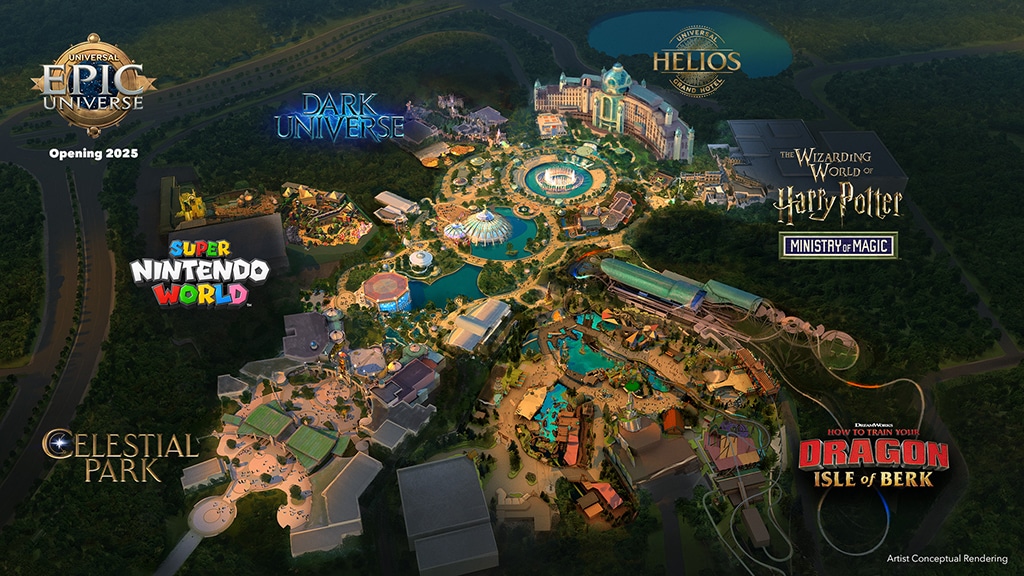

Since Universal Orlando announced its third theme park, fans have been fans have been anxiously awaiting an answer to this question: how will Walt Disney World answer Epic Universe? Well, CEO Bob Iger provided that response and Disney has since offered follow-up. Fair warning: I don’t think this is going to be even remotely satisfying to those of you who have been asking.
The latest development comes via a new article in the Wall Street Journal over the weekend that addresses the threat Epic Universe poses to Disney, mostly via a description of recent and upcoming additions, as well as quotes from fans who are frustrated by Disney’s lethargic pace of construction and lack of a direct “response” to Epic Universe in the form of something big opening in 2025. It’s nothing you haven’t heard if you’ve read recent posts here about Universal and the accompanying reader comments.
There is one tidbit from Walt Disney World in the article: “Epic [Universe] is Universal playing catch-up on a decade of nonstop development at Walt Disney World,” said a Disney spokesperson. The company indicates that it has been offering a steady stream of new and reimagined attractions, pointing to popular rides that have been added or updated in the last decade. This is also nothing new, and echos what CEO Bob Iger said recently about Epic Universe.
Iger’s answer was a literal one, coming during the Q&A portion of the shareholder meeting. In particular, this question asked: “With Epic Universe opening at Universal Orlando in 2025, why hasn’t Disney prepared anything or placed more than just a handful of attractions in the pipeline to be ready in 2025 at Walt Disney World?” In response, Disney CEO Bob Iger gave the following explanation:
“That couldn’t be further from the truth. We’ve been aware of Universal’s plans for a new park for more than a decade. We have a sophisticated approach to analyzing the needs of all our businesses, and strategically deploying capital.
I just want to remind you of a few things that opened at Walt Disney World during this same period: Pandora – World of Avatar at Animal Kingdom; Toy Story Land and Mickey & Minnie’s Runaway Railway at Hollywood Studios. We also completed our multi-year, multi-billion dollar transformation of EPCOT, which included Remy’s Ratatouille Adventure, Journey of Water Inspired by Moana, and the great Guardians of the Galaxy: Cosmic Rewind. We also opened TRON Lightcycle Run at Magic Kingdom.
By staggering these major new launches, we’ve been able to commercially and operationally optimize our new offerings over time rather than all at once. Based on the guest feedback we’ve heard about through all of these additions I’ve mentioned, we know they’re extremely popular and serving our guests very well.
By the way, the agreement we reached with the Central Florida Tourism Oversight District last week will further enable us to pursue the kinds of investment in our Florida parks that you’re talking about. We achieved a win-win result with that deal in terms of our ability to pursue future development opportunities, but also in terms of the thousands of direct and indirect jobs and economic opportunities in Florida that will result from our investment in new projects.
As we’ve discussed regarding our $60 billion capital expenditure plans, there’s so much more coming to our parks around the world–including Walt Disney World in Florida.”
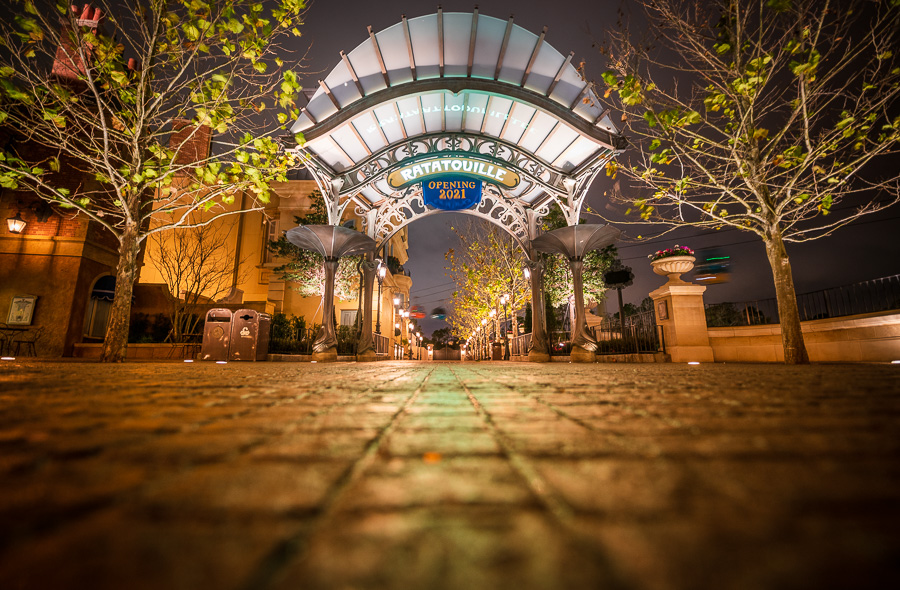

At least in part, we know what Iger is saying is true about Disney’s preference for staggering openings because we lived through this happening–in a bad way.
Remember everything that was supposed to debut “in time for Walt Disney World’s 50th Anniversary?” Now remember when all of that actually opened? Walt Disney World took projects that were supposed to all debut by 2021 and spread them out into 2022 and 2023.
They didn’t do that primarily due to pandemic-induced construction delays, labor shortages, and so forth (although that undoubtedly played a contributing factor). They did it because slow-rolling the opening of attractions was strategically advantageous, especially because they shelved several other projects that were supposed to open in the years after 2021.
That approach has been a sore subject with this blog, but at least from a financial perspective, Disney played its cards well. Well, mostly. I still maintain that it was short-sighted to reduce the scale of the original EPCOT Festival Center and to delay that project for years instead of fast-tracking it. I think this viewpoint has been vindicated by EPCOT attendance and crowds since the World Celebration construction walls have (mostly) come down, but that’s another topic for another day.
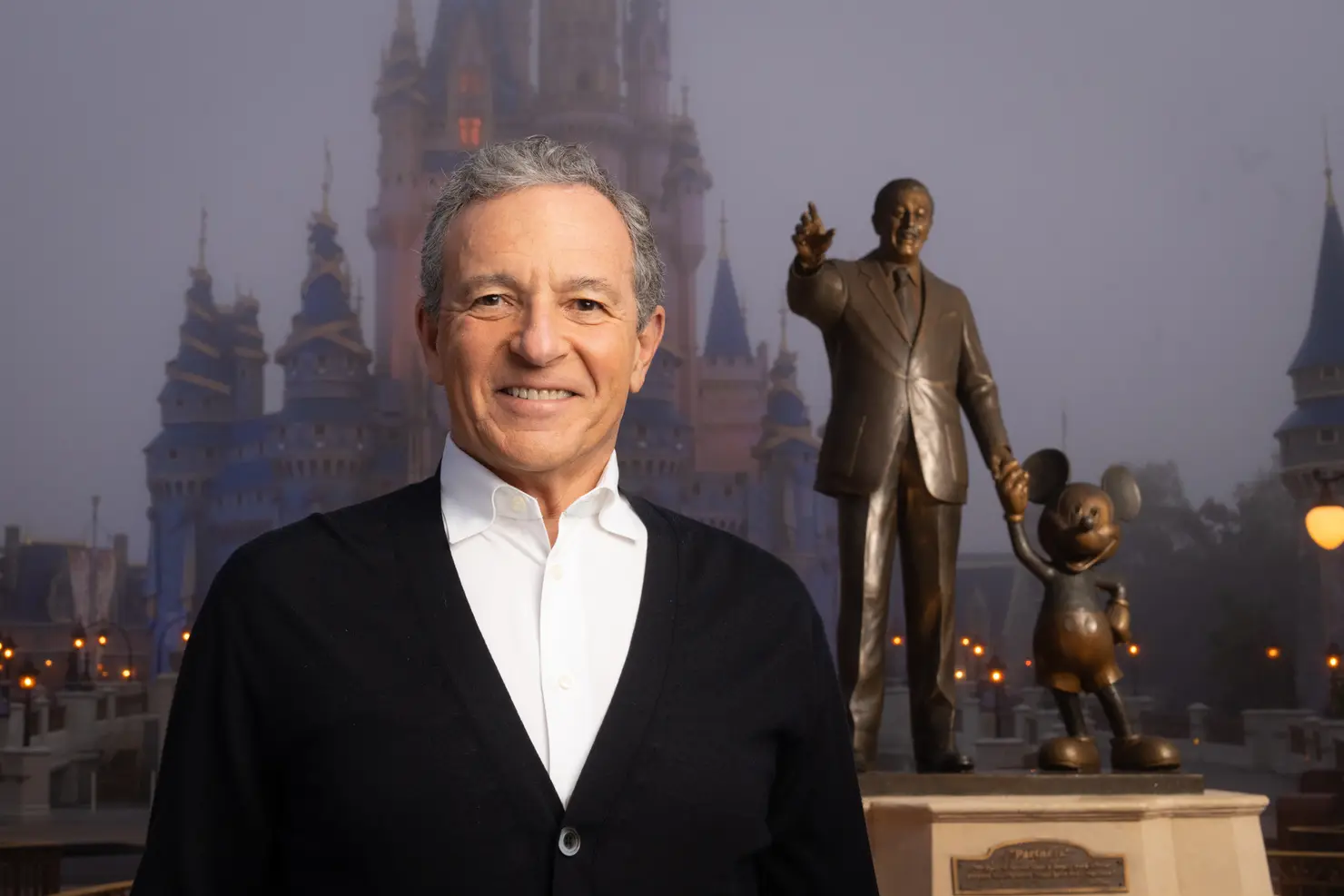

Another thing we know is true is that the resolution of litigation will facilitate further Florida investments. I don’t want to fixate on it too much because I’m very happy to close this chapter and not report on CFTOD vs. Walt Disney World or Iger vs. DeSantis, but it’s worth touching upon those comments briefly since there have been additional developments since our early reporting on the settlement agreement between Disney and CFTOD.
That same afternoon, Governor DeSantis held a press conference during which he struck a more conciliatory tone towards Disney, while also bringing up Epic Universe. DeSantis called the new Universal park a “game-changer” for Central Florida, while adding that he’d welcome Disney building a 5th gate. When that happens, he said that the district will be ready to work on something that’s “good for the state” and for jobs, among other things.
It wasn’t much, but it was two very big things that are a complete 180° change from this same time last year when DeSantis was joking about building a prison at Walt Disney World. It was positive instead of adversarial, and it was about working towards growth in the region instead of hamstringing Disney. DeSantis also differentiated between Walt Disney World and corporate Disney in Burbank, which I view as a purposeful distinction–even if it’s all the same company, he can cast the Californians as the bad guys and the Florida team as the good guys.
In addition to this, we’ve learned more about leadership changes at the Central Florida Tourism Oversight District that are more experienced and friendlier to Disney. These competent individuals will actually ensure that the CFTOD works as it should, and accomplish its purpose.
There’s been a lot of political reporting that has characterized this as a win-win as a result. Some of that is probably face-saving due to prior breathless commentary about how Disney would win in court, but there’s also validity to it. Our commentary has long focused on the political theater angle of this (last year), and why it’s advantageous for everyone to move on and work together towards mutually-beneficial ends (this year). It appears that’s what’s going to happen, which paves the way for the $17 billion investment in Walt Disney World over the next decade. But we shall see.
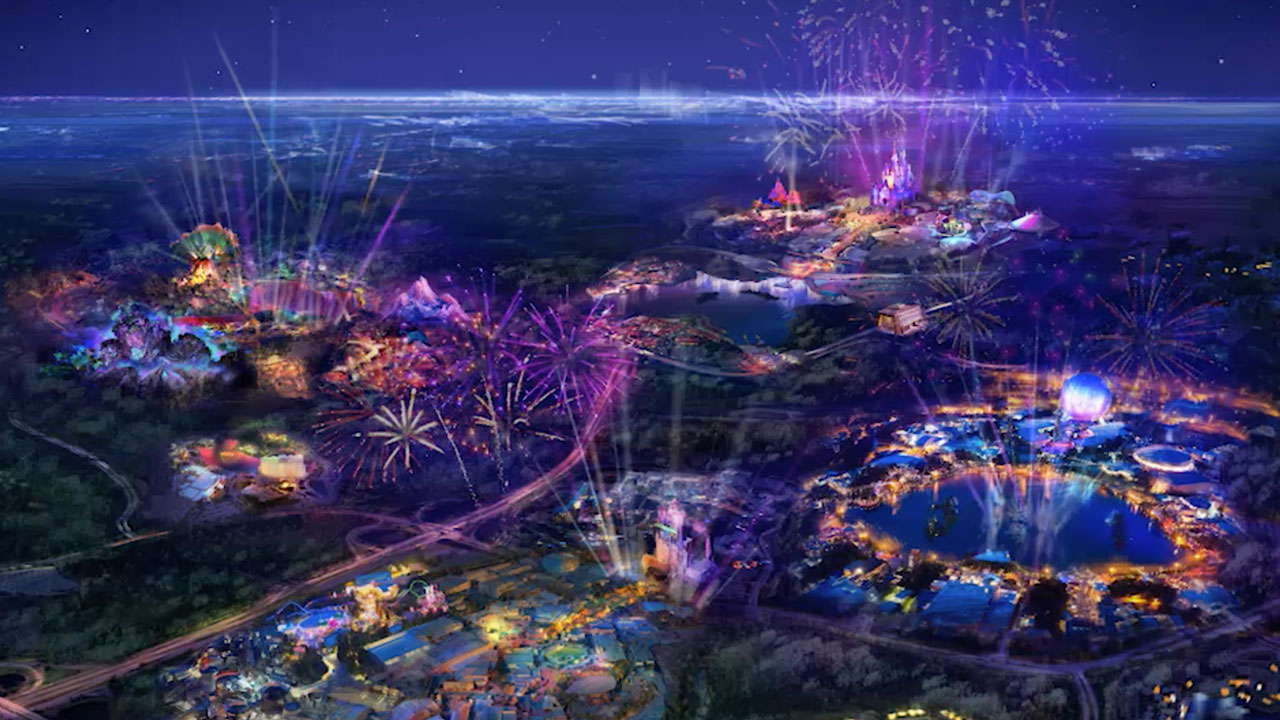

One thing not to expect is a fifth gate, despite DeSantis welcoming one and many fans wanting a new theme park. Our view on that remains unchanged–it absolutely won’t happen. (Here’s Why a 5th Theme Park Will NOT Be Built at Walt Disney World in the Next Decade.)
Honestly, I don’t want a fifth gate to happen anytime soon. This isn’t because I think Walt Disney World is perfect as-is or that another park wouldn’t be cool. Quite the contrary! It’s mostly because 3 of the 4 existing parks need a lot of help (Magic Kingdom doesn’t, but is getting it anyway). That $17 billion would be far better spent improving what’s already there rather than sinking billions into new infrastructure and other things that aren’t new or reimagined rides.
As we’ve also said before, it appears increasingly likely that Walt Disney World is going to “sit out” 2025 and not try to compete with Epic Universe. (I remain of the belief that a reimagined Rock ‘n’ Roller Coaster will be the tentpole addition of 2025. That plus maybe a couple of redone things in EPCOT. Enough to be marketable, but not to actually compete with Universal.)
In reality, Disney won’t have any official answer to Epic Universe beyond the above comments about Universal playing catch-up. They won’t acknowledge the project as a threat. These are all words we’ve written before in previous posts, most notably Is Universal “Beating” Walt Disney World? (Likewise, what follows is commentary reiterating what we wrote there.)


This lack of an “answer” to Universal’s Epic Universe is probably a big part of why disillusioned Walt Disney World diehards are now claiming that Universal is “winning,” “going to destroy,” or “beat” Disney. Fans are frustrated at Walt Disney World’s seeming complacency or arrogance, and want to see them “punished” for it as a result.
I can understand where many disenchanted Walt Disney World fans are coming from and agree with plenty of that sentiment. As a longtime fan, one of my fears for a while has been that Disney is inflicting long-term brand damage for short-term gain. There’s a laundry list of complaints about Walt Disney World. Not to mention Disney’s falling reputation, which is based on all of the above plus other issues. We’ve discussed all of this at length–no sense in belaboring the point here.
I don’t agree with all of the complaints. Citing high crowds as a reason for Disney’s downfall is basically a Yogi Berra quote expressed unironically. I also don’t agree with the volume or intensity of the frustration. But there’s a reason guest satisfaction scores have been down, and also why Bob Iger is working to undo damage and lure back former fans.
With that said, a lot of the above is wishful thinking on the part of disillusioned Disney fans. We’ve been down this road before, and these types of predictions or sentiment have been wrong time and time again. This time is different. Except, it never is. Reports of Disney’s demise are, and always have been, greatly exaggerated.
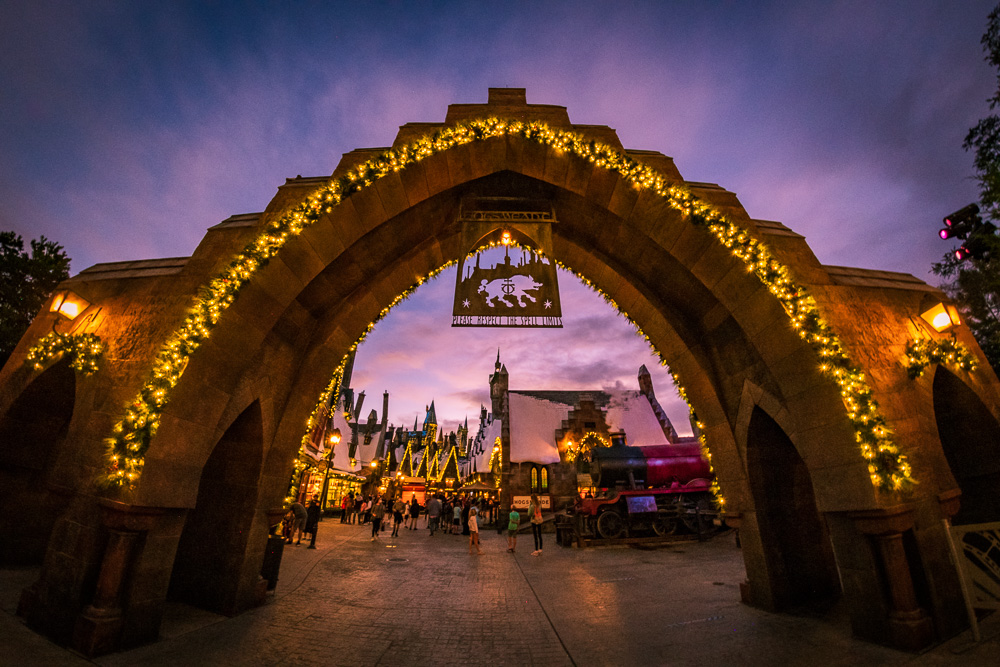

Looking back even further to the last time Universal Orlando debuted a game-changing addition is also instructive. When the Wizarding World of Harry Potter (WWoHP) opened at Islands of Adventure in 2010, the fan dynamic was similar to what it is now, just dialed back since it was before social media.
Starting in 2007 when WWoHP was first announced, there was a constant drumbeat from fans about an “answer.” The key distinct then was that Walt Disney World hadn’t really done anything in the decade prior. Fans at the time were starved for new attractions, as the period between the 9/11 tourism slowdown and the Great Recession had been pretty dark.
There was a much more rational basis in those expectations, as Walt Disney World was struggling and could use new additions. Consequently, there were high hopes for a “Potter Swatter,” and radio silence from Disney for almost two years.
Then Disney finally announced New Fantasyland. For many fans, that wasn’t enough. It didn’t originally include Seven Dwarfs Mine Train–and instead had a bunch of next generation meet & greets (like Enchanted Tales with Belle, but more of them). It was also slated to open after the Wizarding World of Harry Potter.
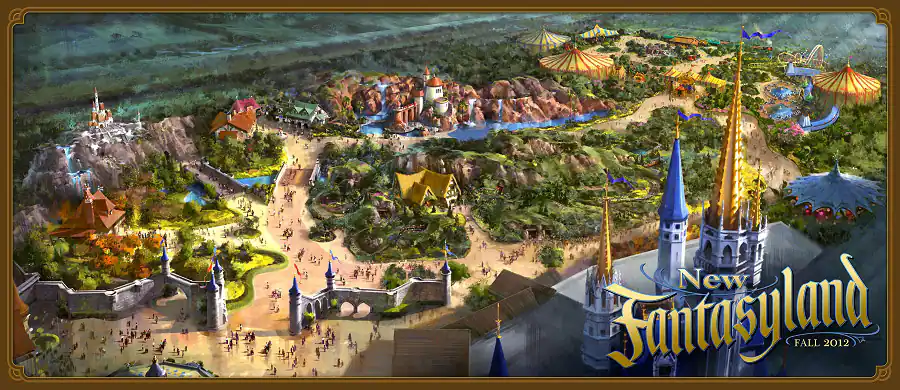

In the lead-up to WWoHP, Walt Disney World’s public position was that “a rising tide lifts all boats” — that a stronger Universal was beneficial to Disney because it attracted more people to Central Florida. In actuality, Universal Orlando’s attendance soared by 1.7 million guests the opening year of WWoHP, with Islands of Adventure seeing 30% growth. Three of Walt Disney World’s parks dropped by 1-1.5%, while Animal Kingdom increased by 1%.
The following year (2011), 3 of the 4 parks at Walt Disney World were up by 1% each, while EPCOT was flat. Islands of Adventure once again surged–another 29% increase–but both Universal Orlando parks had lower overall attendance than any Walt Disney World park. In 2012, Walt Disney World’s parks each increased by ~2.2%. (New Fantasyland began opening on December 6, 2012–too late to have a meaningful impact on that year’s numbers, especially since all 4 parks were up fairly evenly.)
Walt Disney World’s rising tide thesis was correct: Universal had significantly increased its attendance by attracting an entirely new audience to Central Florida, which in turn benefited both (but Universal far, far more). Fast-forward over a decade, and both Universal and Disney have experienced tremendous growth, to the tune of millions of guests per year each. The market for theme parks in Central Florida has gotten larger.
Looking forward, a new analysis from MoffettNathanson, a firm that provides independent analysis to Wall Street institutional investors, concludes that Epic Universe could cause Walt Disney World attendance to decline by about 1 million visitors in the two years spanning 2025 and 2026. Conversely, it could boost overall attendance at Universal’s three parks by more than 8 million. Note that this last number includes Epic Universe, meaning that–at least in theory–the new park could cannibalize attendance from both Walt Disney World and Universal Orlando’s existing two gates.
Also note that these are some of the same big brains that suggested both Disney and Comcast should go all-in on streaming back in 2020 because it would take travel at least 5 years to recover. Prevailing wisdom on Wall Street at the time was that travel may never reach the same post-pandemic heights as it had in 2019, and that streaming was the future. Leisure travel recovered in 2 years, and investors soured on streaming in that same span of time. So not like these dudes have crystal balls (working ones, at least).
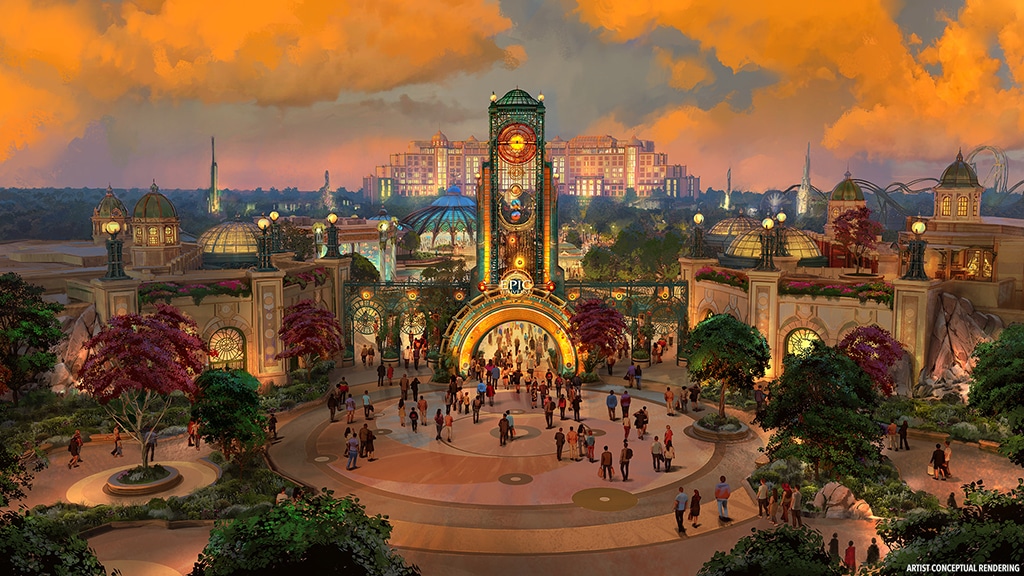

The Wizarding World of Harry Potter was “only” one land back then, but it was a revolutionary one with a massive built-in audience. Epic Universe is an entirely new park, so the scale and scope is different–bigger. Disney has probably concluded that the only way to “win” is to not play the game–to fall back on the “rising tide lifts all boats” mantra. Iger’s comments take this a step further, suggesting that Disney already played the game, but did it over the last decade and as they strategically saw fit.
Regardless of whether that’s spin, the simple fact remains that no new ride or land is going to meaningfully compete with a brand-new theme park. Sitting out this round of the theme park wars and conceding the spotlight for a year might be the best hand that Disney can play. No Disney fan wants to hear this, but might be the smarter move than trying to steal Epic Universe’s thunder. Nothing Disney can do will top Epic Universe.
As fans, it’s also important to have self awareness. We are not the only type of guests who visit Central Florida’s theme parks. If anything, we are outliers. For theme park fans or frequent visitors (like readers of this blog), there’s a better chance that blockbuster new additions are the most compelling draws–a brand-new theme park is going to be of more interest to you than ones that are unchanged and you’ve experienced several times before.
That brand-new park would trump just about anything for you, and that includes a new land at Walt Disney World. If your time is limited, you’re still allocating it towards the new park over whatever Walt Disney World would add.
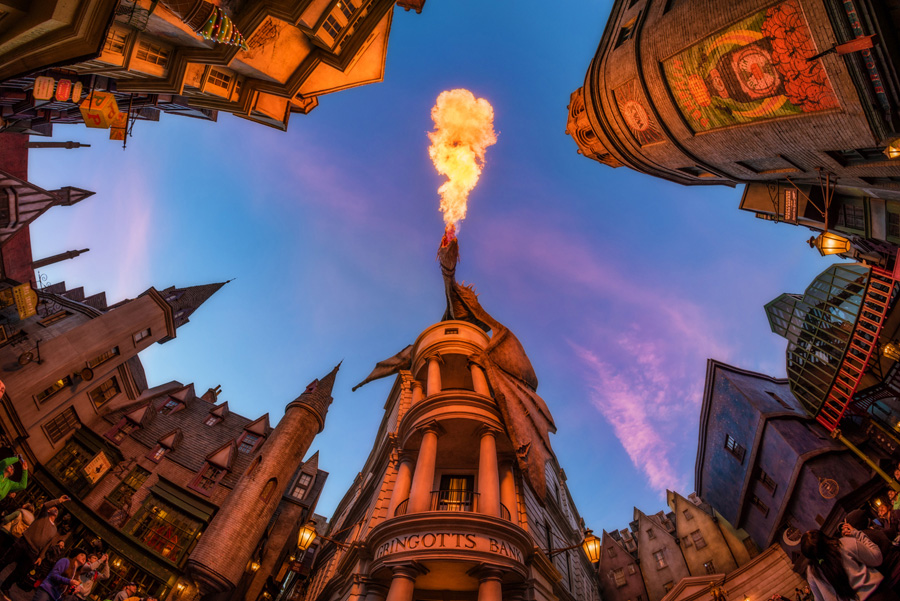

But for most average guests, the new additions from a single year or two do not exist in a vacuum. They aren’t the only selling points of the theme parks. Most people visiting in 2025 aren’t going solely on the basis of what’s brand-new.
Even for fans who visit semi-frequently, there are a lot of other recent, new-to-them additions. Everything from Hagrid’s and Star Wars: Galaxy’s Edge to Tiana’s Bayou Adventure will still be “new” to some fans in 2025. That’s a wide range of offerings spanning several years, but not everyone visits annually. Most people–even those who would self-describe as enthusiasts or fans–do not.
Then there’s the biggest demo of all: first-timers. For this group, everything at every theme park in Central Florida is necessarily new. When choosing which parks to visit, they aren’t simply picking the brand-new additions, although those probably are granted more weight thanks to marketing. They’re looking at the full menu, and what looks most appealing.
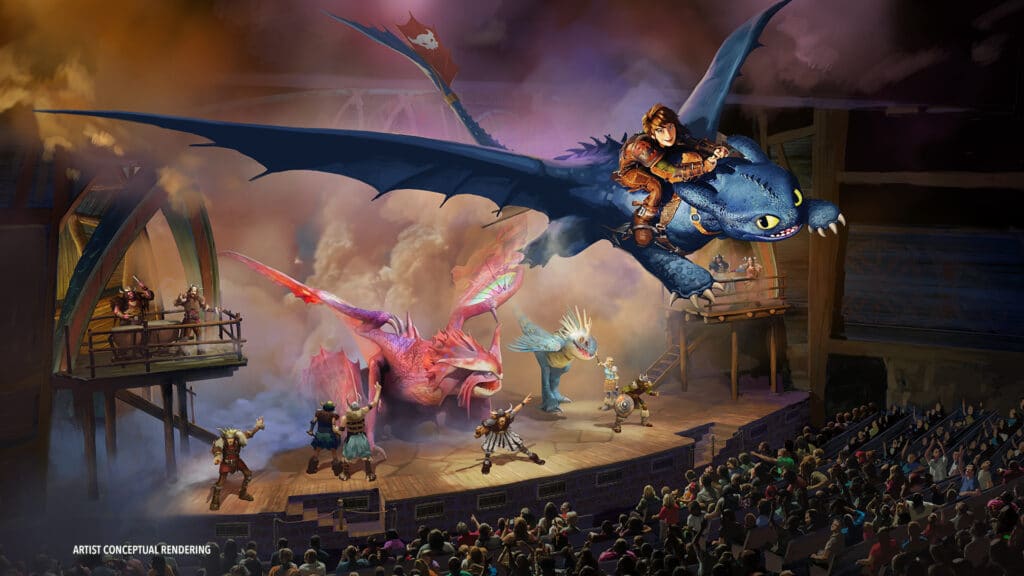

It shouldn’t be contentious to say that Walt Disney World is the more established and time-tested theme park complex. Even after Epic Universe, Walt Disney World still has one more park, a dozen-plus additional resorts, and more recreation.
Regardless of how you feel about recent movies, it also shouldn’t be controversial to contend that the Disney’s stable of characters created and acquired in the last ~100 years is more popular and enduring. Universal has made tremendous strides with popular character intellectual property in the last couple of decades, but they’re still not on level playing fields.
This is where things get more interesting in terms of competition for 2025 and 2026. Both Walt Disney World and Universal Orlando have been aggressively adding in the last decade. Many of Universal’s newest attractions are fantastic–Hagrid’s and VelociCoaster are two of the best roller coasters anywhere. Despite this, Walt Disney World has inarguably spent more money on new attractions and lands in the last decade.
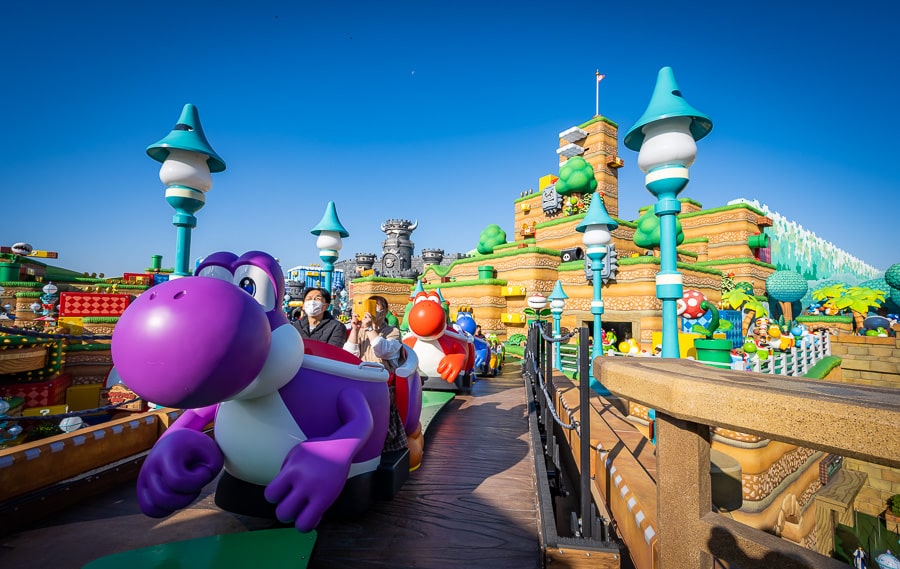

It’s undeniable that the bump will disproportionately benefit Universal Orlando. It may be true that a rising tide lifts all boats, but it does not do so equally. Percentage growth for Universal Orlando as a whole will outpace Walt Disney World as a whole in 2025-2026.
If history repeats itself, Disney’s parks could see slight decreases–but the losses will not be commensurate with the growth at Universal. Stated differently, Super Nintendo World and Epic Universe as a whole will grow the audience for Central Florida theme parks, even if theme park diehards (like you!) visiting Universal and skipping Disney leads to a slight drawdown in attendance.
However, I wouldn’t necessarily bet on Walt Disney World seeing a drop in 2025. Epic Universe has all-ages appeal, but I’d hazard a guess that the park’s main draws (Super Nintendo World, How to Train Your Dragon, and Harry Potter) skew towards families. Not only that, but they do so to a far greater degree than Universal’s two existing gates.
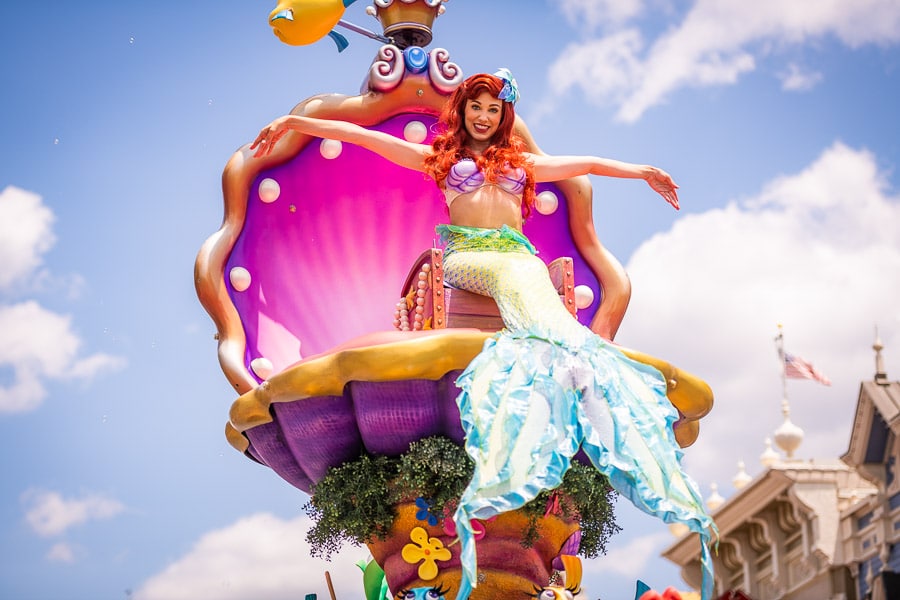

The argument could be made that, as a whole, Walt Disney World does a better job of catering to this crowd than does Universal Orlando. On the basis of new additions, I think you could reasonably argue that Universal has been chasing Disney’s demographics over the last decade and Disney has been chasing Universal’s.
Nevertheless, the reputation still exists that Universal is the place for teenagers and thrill seekers, and Walt Disney World is more family-friendly. Accordingly, I would hazard a guess that many of the families planning 2025 trips to see Universal’s “new Nintendo and dragon park” will also include visits to “Disney World” (Magic Kingdom) and “Star Wars and toy park” (Disney’s Hollywood Studios).
Definitely not more than they visit Islands of Adventure and Universal Studios Florida–convenience is huge, as are vacation packages–but possibly enough that at least those two parks and maybe even EPCOT don’t lose attendance at all in 2025. On the other hand, the situation is only going to get worse before it gets better for Animal Kingdom. No denying that one. Tropical Americas should be fast-tracked in the same way Tiana’s Bayou Adventure has been.
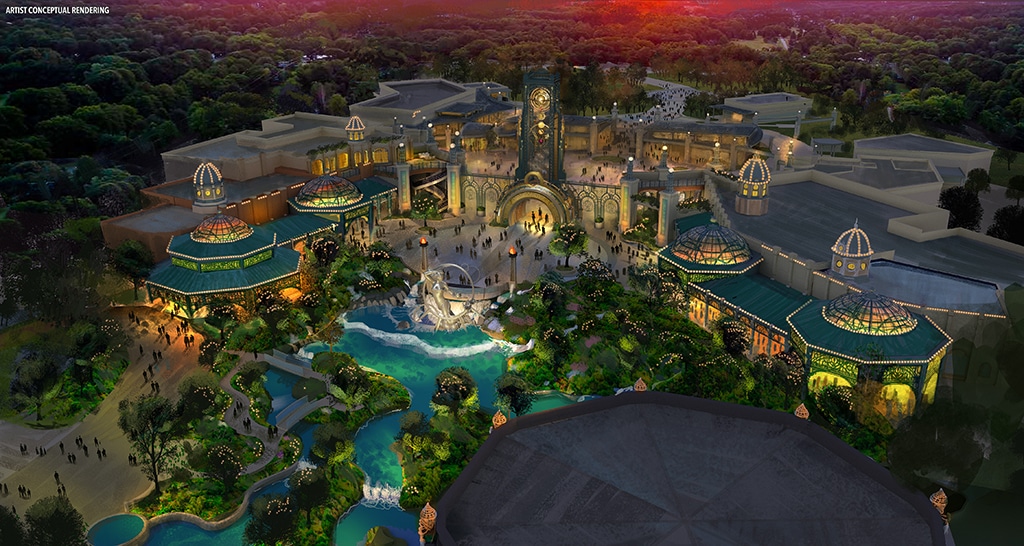

Ultimately, my view is that Disney and Bob Iger are doing a bit of posturing and a bit of truth-telling. (Of course Iger isn’t going to say that Disney is terrified of Epic Universe in that scenario, but it’s also good that he wasn’t completely dismissive.) In reality, Walt Disney World won’t have a direct response to Epic Universe because they already did over the last decade, but also because they can’t have a meaningful one. The streaming boondoggle, among other things, sort of took most options off the table.
Even so, Walt Disney World won’t have no response to Epic Universe whatsoever. While our above commentary is somewhat dismissive of diehards and theme park regulars, they (we!) do exist in meaningful numbers, and not just at the margins. While it’s impossible for Walt Disney World to “beat” Epic Universe next year (both as a matter of timing and significance), it is still possible to debut marketable additions to lure locals, theme park fans, and other fence-sitters to Walt Disney World. That will be an important indirect response even if it (fair warning) amounts to a lot of stuff that gets scorned or ridiculed. (E.g. “Universal is opening a whole new park and Disney is only doing [insert small scale thing] in response?! SAD.”)
As we’ve said before, Universal is not “beating” Walt Disney World or vice-versa. That won’t change in 2025 even as the former further comes into its own as a bona fide theme park destination resort. There’s space in the Central Florida market for both to continue growing and thriving. That’s (somewhat sadly) especially true when expansion is centered around intellectual properties–like Mario, Harry Potter, Star Wars or Marvel–that expand the audience for theme parks, rather than reallocate the existing pool of guests.
My expectation is that Epic Universe is fantastic and envelope-pushing. I hope it grows the audience for Orlando theme parks even further and erodes a little bit of Walt Disney World’s market share. (Not too much to give them cold feet about that $17 billion!) In my view as a long-term Disney and theme parks fan, that’s the best of both worlds. It puts Disney back on their heels and feeling the need to be more competitive, while also justified to invest because it demonstrates that there are ways to grow the pie–not just fight over the same sized one. Competition like that is good for everyone, especially us fans.
Planning a Walt Disney World trip? Learn about hotels on our Walt Disney World Hotels Reviews page. For where to eat, read our Walt Disney World Restaurant Reviews. To save money on tickets or determine which type to buy, read our Tips for Saving Money on Walt Disney World Tickets post. Our What to Pack for Disney Trips post takes a unique look at clever items to take. For what to do and when to do it, our Walt Disney World Ride Guides will help. For comprehensive advice, the best place to start is our Walt Disney World Trip Planning Guide for everything you need to know!
YOUR THOUGHTS
What do you think about Disney CEO Bob Iger’s “answer” to Epic Universe? Think what Disney has opened in the last decade counts for the average guest, even if it doesn’t for you personally? Will the opening of Epic Universe in 2025 will lead to the “demise” of Disney? Or do you generally agree with the perspective that a rising tide lifts all boats? Think growing the market for Central Florida theme parks is an ‘everyone-wins’ best case scenario? Do you agree or disagree with our assessment? Any other thoughts or commentary to add? Any questions we can help you answer? Hearing your feedback–even when you disagree with us–is both interesting to us and helpful to other readers, so please share your thoughts below in the comments!

